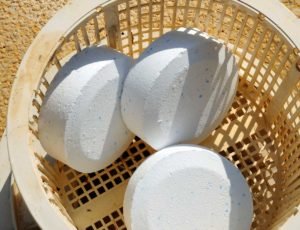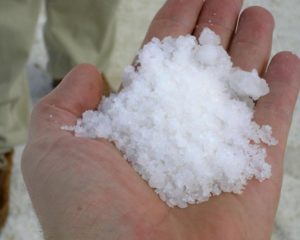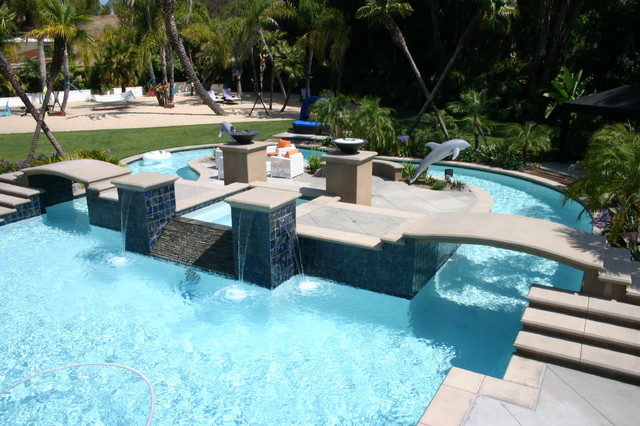Chemicals or Salt?
In the world of private pools, there’s an age-old debate amongst owners: do you go with a salt water pool setup, or do you use chemicals such as chlorine? If you’re new to pools, it can seem like a rather insignificant thing, until the time comes when you’re ready to install one of your own.
One sounds safer, the other more affordable, but is this really the case? Let’s settle the debate between saltwater and chlorine pools once and for all. Here’s all the information you’ll need to make an informed, rational decision you won’t come to regret!
Chemicals
 This might sound startling, but salt water pools do contain chlorine – it’s just not as high a level, and doesn’t need to be added by you. Salt water pools aren’t like ocean water in your backyard; it’s a system that uses salt to reduce the need for harmful chemicals. Chemical electrolysis, initiated by a little mechanism called the salt water generator, a part of the overall system, keeps your pool clean. So while there is chlorine, there’s not nearly as much, which means salt water doesn’t dry out the skin nearly as much.
This might sound startling, but salt water pools do contain chlorine – it’s just not as high a level, and doesn’t need to be added by you. Salt water pools aren’t like ocean water in your backyard; it’s a system that uses salt to reduce the need for harmful chemicals. Chemical electrolysis, initiated by a little mechanism called the salt water generator, a part of the overall system, keeps your pool clean. So while there is chlorine, there’s not nearly as much, which means salt water doesn’t dry out the skin nearly as much.
Chlorine pools don’t need as much time to clean, but they do requires storing, handling, and putting in your pool a number of chemicals, some of which you might not be comfortable with. The chemical levels can also be detrimental to skin and hair health.
Winner: Salt water pools
Upkeep
Salt water generators provide a constant source of chlorine, keeping your pool free from algae and certain other nasty surprises, as well as being less damaging to the structure of the pool itself. They also need only a cleaning once a year. The water does, however, need to be constantly monitored to ensure a proper pH level and salt-to-water ratio is maintained. As well, the salt water generator can be a costly repair, and that once-a-year clean can be a laborious process.
The chemicals used for chlorine pools cut down the time needed to clear up algae and bacteria, often in as little as half the time it would take a salt water pool (1 to 2 days versus 3 to 5). They do, however, require constant monitoring (owning any type of pool makes this unavoidable) and the purchase of testing kits and chemicals. The work is sort of spread out throughout pool season.
Winner: Tie
Price
There’s no denying it: chlorine pools are a lot less expensive than salt water pools. The salt water  generator, an integral part of keeping your pool clean, is a mighty large expense, and keeping it in tip-top condition can also mean costly repairs. It’s also on constantly, meaning it can be a drain on electricity. The costs, after making the upfront purchases, go down over time, but you’ll have to take into account how often you use the pool and how long the season is.
generator, an integral part of keeping your pool clean, is a mighty large expense, and keeping it in tip-top condition can also mean costly repairs. It’s also on constantly, meaning it can be a drain on electricity. The costs, after making the upfront purchases, go down over time, but you’ll have to take into account how often you use the pool and how long the season is.
With chlorine, there’s no extra generators to run, and the resources needed to keep your pool cleaner are much cheaper. Chlorine tablets are an inexpensive maintain your pool, and are as easy to use as dropping into the pool (with caution and following the directions, mind you!). As well, with much less equipment needed, you can operate an above-ground chlorine pool a lot easier if the costs of installing a below-ground pool are prohibitive.
For both, cost is determined by the size – the bigger the pool, the more water you’ll need, which means you’re going to have to spend more money keeping it clean.
Winner: Chlorine pools
Verdict:
It’s sort of up-in-the-air! There’s no real winner, and in terms of choosing one, you should look at how much you have to spend, your comfort with chemicals, and your backyard environment. We wish it was as simple as picking a clear winner, but everyone’s situation is different! Weigh the pros and cons and pick one that’s right for you and your family.


